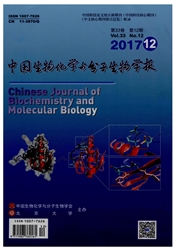

 中文摘要:
中文摘要:
非病毒载体介导的外源基因在哺乳动物骨骼肌细胞中的表达往往受限于基因转移效率的低下.本文利用电穿孔为基因转移方法,研究了人对氧磷酶基因(PON1)在原代培养的小鼠骨骼肌成肌细胞和成熟肌管中的转移与表达.在上述细胞中加入PON1的真核表达质粒后实施一定条件的电穿孔,通过测定不同时间点培养基与细胞裂解液中芳香酯酶活性的变化以衡量PON1的表达与分泌.结果显示,PON1在成肌细胞中表达的最佳电穿孔条件为800 V/cm,20 ms and 50μF;在肌管中为700 V/cm,20 ms and 50μF.在此条件下,细胞存活率均达75%以上,且表达的蛋白均可有效分泌.RT-PCR分析同样验证了PON1 mRNA在骨骼肌细胞中的高效表达.电穿孔介导的PON1基因表达效率显著高于传统的基因转移方法如磷酸钙法和阳离子脂质体法.因此,以不同分化阶段的骨骼肌细胞为靶细胞,通过电穿孔介导外源基因表达切实可行,并可能在细胞工程与基因治疗等领域均具有潜在的应用前景.
 英文摘要:
英文摘要:
Gene transfer in primary mammalian myocytes via non-viral methods has been cumbered by the low efficiency of transfection.We developed a simple and reproducible procedure to transfect human paraoxinase 1 gene(PON1) into the primary cultures of mouse myoblasts and mature muscle cells.Electroporation was used to promote the PON1 delivery in mouse myogenic cells and myotubes with high cell viability.The highest arylesterase activities in culture medium of myoblasts was 0.954±0.187(U/ml) under the conditions of 800(V/cm),20 ms and 50 μF,whereas in myotubes,it was 2.611 ± 0.420(U/ml) under 700(V/cm),20 ms and 50 μF.Respectively 87% and 84% of the expressed PON1 in myoblasts and myotubes were secreted into culture medium after electroporations.The PON1 mRNA in mouse myocytes was detectable by RT-PCR.As the efficiency of PON1 expression in muscle cells with our approach was significantly higher than that by calcium phosphate or cation lipid method,it might be potentially useful for the non-viral delivery in bioengineering and gene therapy.
 同期刊论文项目
同期刊论文项目
 同项目期刊论文
同项目期刊论文
 Isolation of four pepsin-like protease genes from Aspergillus niger and analysis of the effect of di
Isolation of four pepsin-like protease genes from Aspergillus niger and analysis of the effect of di Protective effects of transgene expressed human PON3 against CCl4-induced subacute liver injury in m
Protective effects of transgene expressed human PON3 against CCl4-induced subacute liver injury in m Expression, refolding, and characterization of recombinant thrombopoietin/stem cell factor fusion pr
Expression, refolding, and characterization of recombinant thrombopoietin/stem cell factor fusion pr A novel thrombopoietin-stem-cell factor fusion protein possesses enhanced potential in stimulating m
A novel thrombopoietin-stem-cell factor fusion protein possesses enhanced potential in stimulating m Cascade Signal Amplification Strategy for Subattomolar Protein Detection by Rolling Circle Amplifica
Cascade Signal Amplification Strategy for Subattomolar Protein Detection by Rolling Circle Amplifica Comparative evaluation of the protective potentials of human paraoxonase 1 and 3 against CCl4-induce
Comparative evaluation of the protective potentials of human paraoxonase 1 and 3 against CCl4-induce Studies on protective effects of human paraoxonases 1 and 3 on atherosclerosis in apolipoprotein E k
Studies on protective effects of human paraoxonases 1 and 3 on atherosclerosis in apolipoprotein E k A simple electrochemical lectin-probe for in situ homogeneous cytosensing and facile evaluation of c
A simple electrochemical lectin-probe for in situ homogeneous cytosensing and facile evaluation of c A facile scanometric strategy for ultrasensitive detection of protein using aptamer-initiated rollin
A facile scanometric strategy for ultrasensitive detection of protein using aptamer-initiated rollin Real-time monitoring of cell viability by its nanoscale height change with oxygen as endogenous indi
Real-time monitoring of cell viability by its nanoscale height change with oxygen as endogenous indi CuO-Doped Mesoporous Silica Hybrid for Rapid and Sensitive Amperometric Detection of Phenolic Compou
CuO-Doped Mesoporous Silica Hybrid for Rapid and Sensitive Amperometric Detection of Phenolic Compou Ultrasensitive scanometric protocol for detection of matrix metalloproteinases using histidine tagge
Ultrasensitive scanometric protocol for detection of matrix metalloproteinases using histidine tagge In situ assembly of gold nanoparticles on nitrogen-doped carbon nanotubes for sensitive immunosensin
In situ assembly of gold nanoparticles on nitrogen-doped carbon nanotubes for sensitive immunosensin Noncovalent functionalization of carbon nanotubes with lectin for label-free dynamic monitoring of c
Noncovalent functionalization of carbon nanotubes with lectin for label-free dynamic monitoring of c Disposable reagentless electrochemical immunosensor array based on a biopolymer/sol-gel membrane for
Disposable reagentless electrochemical immunosensor array based on a biopolymer/sol-gel membrane for Electric field-driven strategy for multiplexed detection of protein biomarkers using a disposable re
Electric field-driven strategy for multiplexed detection of protein biomarkers using a disposable re Coreactant enhanced anodic electrocherniluminescence of CdTe quantum dots at low potential for sensi
Coreactant enhanced anodic electrocherniluminescence of CdTe quantum dots at low potential for sensi Sampling-resolution strategy for one-way multiplexed inummoassay with sequential chemiluminescent de
Sampling-resolution strategy for one-way multiplexed inummoassay with sequential chemiluminescent de Noncovalent nanoassembly of porphyrin on single-walled carbon nanotubes for electrocatalytic reducti
Noncovalent nanoassembly of porphyrin on single-walled carbon nanotubes for electrocatalytic reducti Effective cell capture with tetrapeptide-functionalized carbon nanotubes and dual signal amplificati
Effective cell capture with tetrapeptide-functionalized carbon nanotubes and dual signal amplificati 期刊信息
期刊信息
